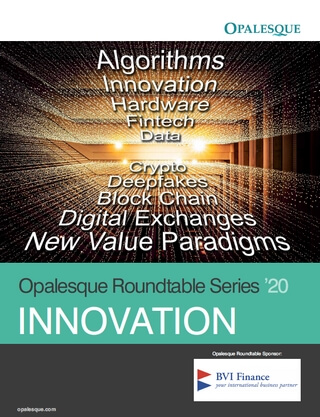英文全文
Ms. Lisa Lou, President of Bank of Asia, recently participated in the Opalesque Roundtable Series on Innovation titled: "The Great Disruption: Innovation, Digitization & Multiplicity of Value Systems". She talked about banks and financial institutions' challenges to engage in real innovation, and how the new generation of Fintech powered banks and financial institutions, such as Bank of Asia, are transforming this industry. The virtual roundtable was sponsored by BVI Finance and attended by senior financial professionals from the industry. The group also discussed why BVI became the offshore destination for the crypto sector, the recently launched "BVI Sandbox" and the fund-friendly approach to Fintech etc.
Below are Ms. Lisa Lou’s full remarks:
Moderator: Lisa, do you have some thoughts regarding Rik's comments about banks and financial institutions' limitations to engage in real innovation as their efforts would mainly circle around trying to extend their 20th century business model into the 21st rather than create or co-create the new paradigms and models of the future?
Lisa Lou: I do to a certain extent agree with Rik, at the same time, I also believe and have seen the change in financial institutions and industry towards innovation. My own career can be an example. Since graduation, I have been working with the so-called legacy banks like big U.S. banks and UK banks. My decision to join Bank of Asia is more or less a reflection of Fintech attractiveness. Part of that decision was based on my belief that within the financial industry we are able to see that digitalization is transforming the world, including banking and financial industry eventually. But it's also true that there are many challenges to the existing financial market and banking system, and that it's very hard for them to move.
In the meanwhile, it is also clear that the existing banking and financial institutions also want to move on and transform and convert the business to capture the digitalization but the question is how to deal with the immediate impact including self-killing some existing business and revenue, hence it is not easy.
As such, new generation Fintech powered banks and financial institutions are well positioned to bring the change and try out new models to serve the digital industry players. Bank of Asia is one example.
We already have several kind of digital banking set ups in the US and Europe in the process of launching licenses for the digital bank. Before I speak about the BVI, I will share a couple of observations in Asia where several jurisdictions have started to launch digitalization-related licenses, even as advanced as security token type of license. Another example would be China who is exploring digitalization of their Fiat currency instead of cryptocurrency. They start testing with part of the salaries/benefits that are made directly into e-wallets via Fiat currency. People can use e-wallets to make payments or purchase.
Turning to the British Virgin Islands now, we do see very positively that this location can create a friendly ecosystem for digitalization by joint efforts from government, regulators and industry players. As we have touched on, when it comes to digitalization of the financial world, many things need to be developed. We know that from a regulatory perspective, the BVI authorities are very much in line and supportive of these developments. We also know BVI being a tax and politically neutral jurisdiction and while the population isn't that large, there are many financial services related entities here such as the company and funds service providers.
We already see that BVI is attractive to some of the fund that already include digital asset portfolios. The question for us is how the society and the financial services industry can support this new paradigm and the emerging new products?
Taking ourselves as an example, being a new generation digital bank we are very open to explore ways how we can support the digital players. We have already started providing services for fund companies that have some of their portfolios in digital assets. It is currently not that easy for such players to receive regular banking services, even for the Fiat currency part, within the legacy banking system. Hence we started together with the regulator and with the industry players to create a supportive environment for these companies. We start offering stable and regular banking support to crypto players. We are also hopeful and positive that the region can continue attracting more players and as the regulation is gradually advancing and becoming clearer, this region can really build a comprehensive and leading ecosystem that encompasses both the Fiat currency and the Crypto part.
One way of doing that is to have more digital exchanges set up and registered here. We see that a lot of the technological innovations have already been developed and established, but there are still challenges how to put them into the practical world. And that's again where we see our role and commitment to contribute.
阅读活动总结

